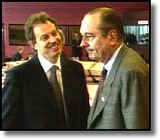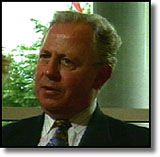
|
Blair Wins Defence GuaranteesOn the second and last day of the EU summit in Amsterdam, the Prime Minister has won guarantees from the rest of the European Union that NATO will remain the cornerstone of Western defence.Recognition of the NATO alliance's continuing key role came after a battle at the summit to ditch EU plans to create a new European defence role - with the Western European Union at its heart. Mr Blair warned from the start of the summit that he would never see NATO undermined. He drafted the terms of the deal himself. He insisted that NATO's 50-year contribution to Western security be explicitly acknowledged in the terms of a new Euro Treaty to be signed at the end of the summit in Amsterdam. The original draft Treaty called for the gradual integration of the WEU into the EU. Then, at Mr Blair's insistence, a revised draft talked of fostering EU relations with the WEU "which might in time lead to" its integration.
Mr Blair has now decided the wording had been watered down sufficiently to safeguard NATO and put off any serious discussion of changing allegiance to the WEU for years. The Finns pitched in to give NATO's role more safeguards by insisting that the deal include a clause stating that no deal could be done without ratification by every single national Parliament involved in the EU. The issue of streamlining the EU's decision-making process and the problem of a two-speed Europe are still unresolved. Britain and the other larger states are pressing to be given a stronger voice in the Council of Ministers , but the smaller states are determined not to lose any power. Mr Blair was facing the prospect of conceding that member states wishing to proceed with Euro-integration faster than others will be able to do so without requiring the approval of all EU countries. Britain had been pressing for an effective veto on "fast lane" member states if it decided that the two-speed Europe was not in Britain's interests. Mr Blair has agreed to give up the veto in areas of industrial policy, regional, research and development and some aspects of environment. But he is virtually assured that the final shape of the accord will contain victories on border controls, defence, and jobs. And in separate discussions, Britain is still hoping to win new restrictions on the practice of so-called quota-hopping in the fishing industry. "There are still a number of differences. The devil is in the detail," said the Dutch Foreign Minister Hans Van Mierlo. "But things are going forward in an extremely optimistic atmosphere." EU leaders appeared in ebullient mood after patching up a huge policy divide between Germany's desire for strict budget discipline ahead of the launch of the single European currency, and France's demand for job-creation schemes.
With the row behind them, EU leaders immediately returned to work on the new treaty, which has been under discussion for 15 months. The EU has promised to open negotiations with a host of central and eastern European states eager to join the powerful trading bloc within six months of the new treaty being signed. A number of states want to allow some countries to forge closer ties at a faster rate than others. Britain wants individual member states to have a veto over such plans, but the Germans are adamantly opposed to this. Earlier, the leaders earlier paused for lunch and staged a short race on new bicycles presented to them by the Mayor of Amsterdam. While German Chancellor Helmut Kohl and French President Jacques Chirac declined to take up the challenge, Blair, Dutch Premier Wim Kok and Austrian Chancellor Viktor Klima sped off, reinforcing the image of a two-speed Europe. |
Diana, Princess of Wales, 1961-1997
Conference 97
Devolution
The Archive
News |
Issues |
Background |
Parties |
Analysis |
TV/Radio/Web
Interactive |
Forum |
Live |
About This Site
News |
Issues |
Background |
Parties |
Analysis |
TV/Radio/Web
Interactive |
Forum |
Live |
About This Site
© BBC 1997 |
politics97@bbc.co.uk |


